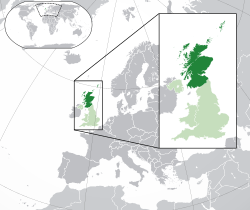A request that this article title be changed to HM Inspectorate of Prisons for Scotland is under discussion . Please do not move this article until the discussion is closed. |
 | |
| Agency overview | |
|---|---|
| Formed | 29 October 1980 |
| Type | Scottish public body |
| Jurisdiction | Scotland |
| Headquarters | Saughton House, Broomhouse Drive, Edinburgh, EH11 3XD 55°55′48″N3°16′34″W / 55.930°N 3.276°W |
| Employees | 11 |
| Minister responsible | |
| Agency executive |
|
| Parent agency | Scottish Government |
| Website | www |
| Map | |
 Scotland in the UK and Europe | |
HM Inspectorate of Prisons for Scotland was established in 1981, following recommendations of the May Committee report of 1979. The Inspectorate is directly funded by the Scottish Government.
Contents
- Origins
- Remit and jurisdiction
- Personnel
- Previous HM Chief Inspectors
- See also
- References
- External links
As of July 2018, His Majesty's Chief Inspector of Prisons for Scotland is Wendy Sinclair-Gieben. [1]
